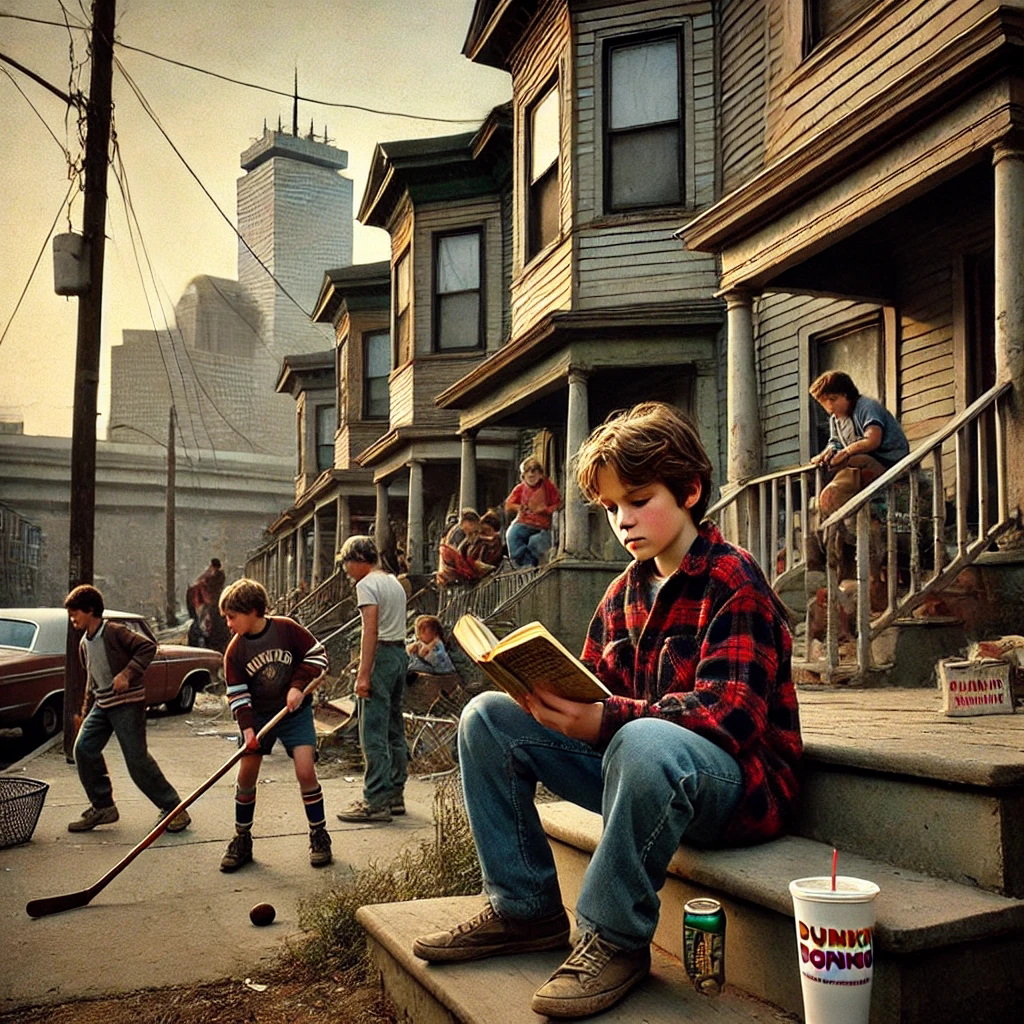By Lou Toad
There was always something vaguely suspect about being the kid with his nose in a book in 1990s inner-city Boston. Especially in Eastie, where I grew up—triple-deckers crammed together like old teeth, the airport skyline flickering in the windows, and the low murmur of NESN sports talk from every open screen door. Intelligence, or at least the performance of it, was met with suspicion, sometimes outright hostility. You could be smart, sure. You just couldn’t be a **smarty-pants.**
I got called “mad retahded” more times than I can count, which in the upside-down logic of the neighborhood meant I was too smart for my own good. You start spouting off about something—history, science, some book nobody else was reading—and suddenly you’re “some kinda fuckin’ genius now, huh?” The code of the streets (or at least the block) dictated that if you weren’t talking about the Sox, the Pats, or what some wiseass down the bar at Jeveli’s got up to last weekend, you were talking wrong. You were talking **not Boston.**
At home, my family saw my bookishness as both a point of pride and a potential liability. My old man, a dockworker with calloused hands and a poetic sense of profanity, would marvel at my vocabulary but remind me not to get “too big for my britches.” My mother, a second-generation Irish-Italian hybrid who could recite long stretches of Shakespeare but never finished college, had a kind of melancholy admiration for my scholarly streak. “Smart kids leave,” she’d say, not quite warning, not quite lamenting.
It took me a long time to realize that what I thought was a totally alien impulse—the autodidact urge to teach myself whatever I could—was as Boston as a Dunkin’ cup balanced on a snowbank. I had no clue as a kid that this city had been built, intellectually speaking, on the backs of working-class scholars, self-educated radicals, and book-hoarding weirdos who were just as out of step with their neighborhoods as I was with mine.
I didn’t know then about the Brahmin-versus-Bullshit dichotomy of Boston academia—the fancy-pants Harvard types on one side and the scrappy street philosophers on the other. I didn’t know about the industrial-era mechanics’ libraries that let factory workers educate themselves or the radical bookstores where leftist dockworkers debated Marx over black coffee. I thought my inclination to teach myself was some mutant strain of Eastie eccentricity. Turns out, it was old as the cobblestones.
But that realization came later.
At the time, I was just some punk-ass kid in a flannel, dodging verbal jabs from kids who didn’t trust a guy with too many words. Learning to deploy my intelligence strategically. Play dumb when necessary. Drop my “r”s enough to pass. Keep the book smarts quiet unless I could weaponize them into a devastating wisecrack. And most importantly: never, ever correct someone’s grammar.
Boston, after all, is a city that loves its contradictions. You can be a Harvard PhD and still talk like you work at a Quincy shipyard. You can be some scrappy working-class autodidact and still teach yourself enough to blow Ivy League minds. I didn’t know it at the time, but my whole Eastie education—the streets, the skepticism, the unspoken code—wasn’t at odds with Boston’s academic history. It **was** Boston’s academic history. I just had to grow into it.
And learn when to keep my mouth shut.

No comments:
Post a Comment